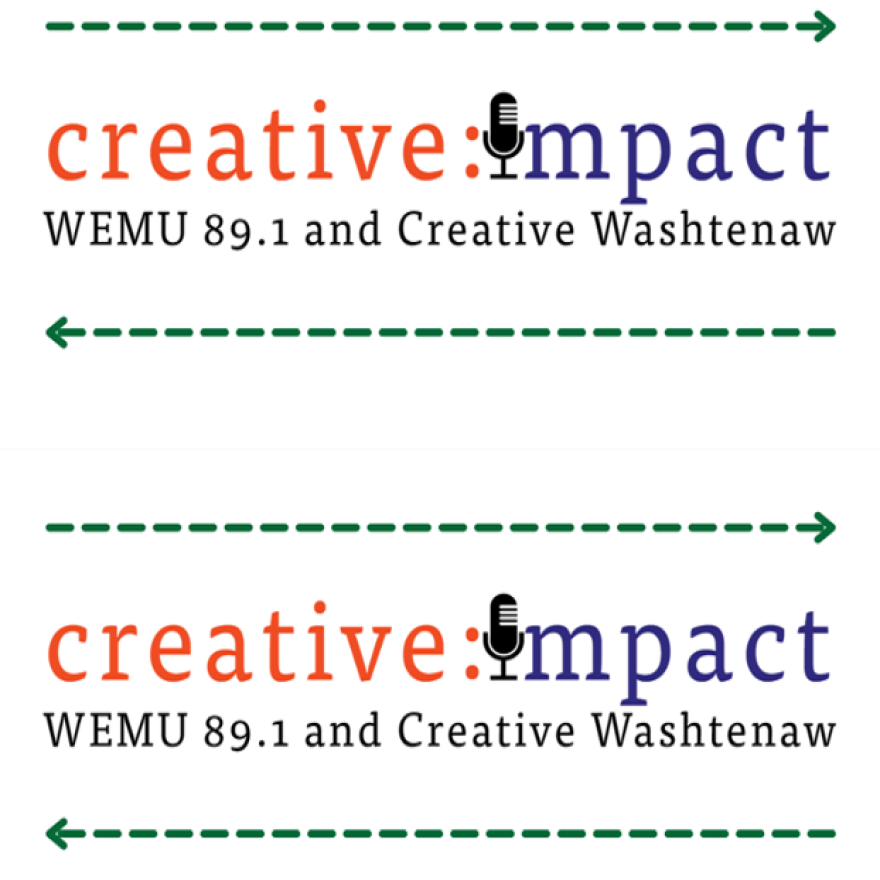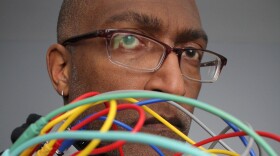Creative industries in Washtenaw County add hundreds of millions of dollars to the local economy. In the weeks and months to come, host Deb Polich, the President and CEO of Creative Washtenaw, explores the myriad of contributors that make up the creative sector in Washtenaw County.

ABOUT CLAIRE MOORE:
Claire Moore is the arts and gallery manager of the Disability Network Washtenaw Monroe Livingston.
From her LinkedIn page:
"I am inspired by the impact people have upon one another and themselves. Leading art workshops, founding artist collectives and gallery spaces, and serving on city arts and culture boards has strengthened my belief that absolutely everyone is creative and in the incomparable power of community."
RESOURCES:
Disability Network Washtenaw Monroe Livingston (DNWML)
TRANSCRIPTION:
Deb Polich: Welcome to creative:impact, 89 one WEMU's weekly feature focused on the people powering the arts and creative industries in Washtenaw County. I'm Deb Polich, president and CEO of Creative Washtenaw. And I'm your host. As we do each week, it's our pleasure to welcome a member of this creative community to the show. Claire Moore is an interdisciplinary artist, designer and educator, who, like me, believes that absolutely everyone is creative. Let's meet her and find out how her work reinforces that belief. Claire, welcome to the show!
Claire Moore: Hi, Deb! Thanks so much for having me!
Deb Polich: So, I have to mention that you earned your Master's of Fine Arts right here at EMU!
Claire Moore: I sure did!
Deb Polich: That's great! What is your core discipline? And how are you applying that today?
Claire Moore: Yeah. So, my major--my core discipline--was interdisciplinary studies, so I kind of couldn't choose. I tried to pick a favorite baby, essentially, and couldn't do it. So, I'm really a big fan of the multimedia and really kind of utilizing my ability to sort of tap into different media and teach that, like sort of facilitate classes around that. As someone who facilitates many classes, I really like to be able to offer a variety of options to folks, and I think that background sort of comes in handy quite a bit.
Deb Polich: I imagine so! And currently, you are the arts and social support program manager at the Disability Network of Washtenaw Monroe and Livingston County. Tell us about the Disability Network and its work.

Claire Moore: Absolutely! I'd be happy to! We are really, I like to call us, sort of a one-stop shop of a disability resource touchstone. So, if we don't offer something, a resource of some variety sort of focused or centered on the disability community or access, we probably know somebody who does. Our mission definitely is to empower the lives of people with disabilities. And we also advocate for just a more inclusive community for everyone.
Deb Polich: And with that, do you also work with organizations--cultural organizations, for that matter--to help them understand making their venues and their programs accessible to folks with various disabilities?
Claire Moore: Yes, we absolutely do! We do a lot of advocacy and awareness training and work in the community. We often do accessibility tours or kind of walkthroughs through spaces, businesses, organizations. We actually have been working with local theaters to create more sensory and accessible spaces for live performances, for example, or even for movies. Yes. And we also do offer programmatic guidance as well. So, if someone is creating a new program, regardless of the focus, we can help them make sure that it's more inclusive and accessible to more people.
Deb Polich: That's great! You know, years ago, when the American Disability Act first came into play, I was attending a conference at the National Association of Theater Owners, and there was a session on the ADA. And the person who was leading it--he welcomed us all as, "Hello, all you temporarily abled people!" And the look in the room was quite a shock because, of course, many people that are able, so to speak, never think that, at some point, they're going to face a circumstance where they may have some disability, but it's really true. So, the work that you do has to be very impactful and very important. So, thank you for that. So, you are doing workshops that weren't a feature at the Disability Network--art workshops. This didn't happen before COVID. How did it and why did it start?
Claire Moore: Yes. So, actually we had just like a sort of a very basic art workshop that would happen before I was brought on. But as 2020 happened, I think a lot of us were sort of looking for a social, maybe creative outlet, and it was so hard to come by. None of us knew how long things were going to last. And I think I just sort of had....honestly, I was mid graduate program at Eastern. So, I was like, "Boy, what can I do? What can I do for my community? What can I do to feel social?" And I reached out to Disability Network where I actually had just been volunteering for a while and asked them, "Hey, do you guys want to try a virtual art program? See how it goes?" And we want to do over here at Disability Network, they were just so excited to experiment and see what would happen. So, we did that, and it kind of just sort of blossomed into this really robust arts program. I've been with the organization now for four years, and it has become kind of one of our feature rec offerings. And we just have weekly arts classes, several are in-person. We have a virtual option. We have weekly theater classes now. We're starting this DisScribe, which is a writers' group--another creative outlet. We're also bringing in guest facilitators now to offer different, more specialized features, like different classes. We're doing an accessible dance class this next season. There's just so many sort of ways that we can offer creative things to to our community. And Disability Network is just so open to seeing what will work and kind of recalibrating as we go. It's a really lovely place to be!
Deb Polich: It sounds like it! This is 89 one WEMU's creative:impact, and our guest is Claire Moore. She is the arts and social support and program manager at the Disability Network. So, would you say that your, I guess maybe we would call them clients or participants--do they engage with this in what you do from more of an occupational, professional or recreational point of view?

Claire Moore: Really great question! Yeah, our studio artists--it's a very wide variety of reasons to attend or reasons to participate. So, we have artists who maybe haven't picked up a paintbrush or a colored pencil in years and are just looking for a creative outlet a few times a week. We also have artists who have been with me basically since the pandemic who decided to go back to school and pursue arts as a career, which is just a really incredible thing to witness. So, it's a lot of working artists who are doing fairs, who are doing exhibitions across the region. And then, there are also artists who are truly just using this as a social creative outlet.
Deb Polich: So, across the board there! You mentioned a fair. And I understand that you are hosting holiday pop-up markets this winter featuring the work of your artists. The next one is December 7th at the Disability Network on Research Drive in Ann Arbor. Is this a new thing? Is this holiday market new this year?
Claire Moore: Yes. So, this is technically our second year doing the market. It was much smaller our first year, but we had a great turnout. And a lot of the artists who were involved asked to do it again. So, we sort of widened the search pool with our call for artists. We actually have artists participating both within the Studio Disability Network, but also as sort of different community members across the region. So, yeah, this is our second annual. It's going to be a great time! We're expecting a really, really good turnout this year!
Deb Polich: And may I ask. As everyone who's participating, are they, in some way or another disabled?
Claire Moore: Yes, great question. Yes. All of the artists consider themselves artists with disabilities. So, yeah, everyone participating as an artist is a disabled artist.

Deb Polich: So, you heard me stumble on that because I am one of those folks that always wants to respect everybody we're talking about, too. And I sometimes find that the language, the proper terms to use, in speaking of people with disabilities is is one that I stumble over. What do you recommend to somebody like me who gets a little uncomfortable and isn't sure?
Claire Moore: That is such a great and such a common question. I will say that, often my friends and my family members, they turn to me. "What should I say? What's the right thing to say?" So, I feel like that's very common. I would say generally kind of person-first language has been the norm for the last, I would say, several decades. So, that would be a person with a disability or an artist with a disability. That being said, there are definitely artists who are or people who are considering...you know, disability cannot be discounted. It cannot be something that's ignored. It's a very inherent part of me, and it makes me who I am. So, a lot of those folks choose identity first, so they might consider themselves a disabled person or a disabled artist. I kind of go back and forth. I'm very fluid with my language. But it's, of course, very individual. So, different people have different sort of feelings about it.
Deb Polich: Well, I'm sure that the work that you're doing is impactful in many ways. My last question for you, and we've got to wrap up pretty quickly, but did you imagine when you went to get that MFA at EMU that your path would lead to this kind of work?
Claire Moore: You know what, Deb? I actually tell everybody that I've manifested the heck out of this job. This is truly my dream job. This is what I wanted to do. I have been involved in the disability community in some capacity or another since I was very young. And I consider myself an artist with a disability. And I just felt this is what I want to do. This is my passion. This is my drive. And I wanted to facilitate classes, and I wanted to do it in a disability space or at least a space that was tangential to that community or could serve that community. And, yeah, I truly feel like I have my dream job. I feel very lucky!
Deb Polich: A dream come true and an impactful dream at that! Claire, thanks so much for being on the show!

Claire Moore: Thank you, Deb! It was great being here!
Deb Polich: That's Claire Moore, arts and social support programmer at the Disability Network. Find out more about her and the network, as well as the holiday market, at wemu.org. I'm Deb Polich, president and CEO of Creative Washtenaw and your host. Mat Hopson is our producer. Please join us every Tuesday to meet the people who make Washtenaw creative. This is 89 one WEMU, Ypsilanti. Public radio from Eastern Michigan University.

If you'd like to a guest on creative:impact, email Deb Polich at deb.polich@creativewashtenaw.org.
Non-commercial, fact based reporting is made possible by your financial support. Make your donation to WEMU today to keep your community NPR station thriving.
Like 89.1 WEMU on Facebook and follow us on Twitter
Contact WEMU News at 734.487.3363 or email us at studio@wemu.org







